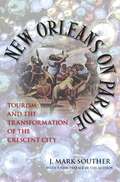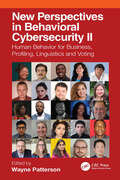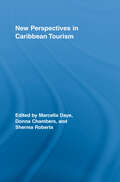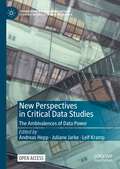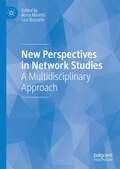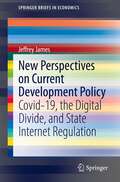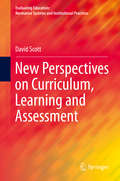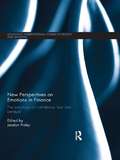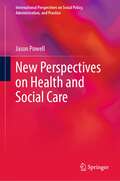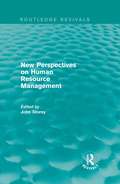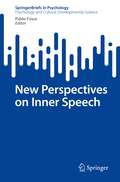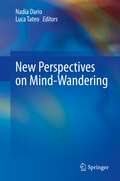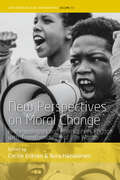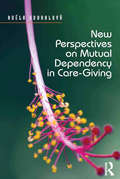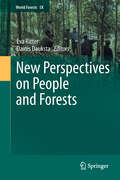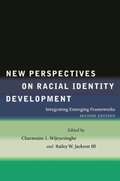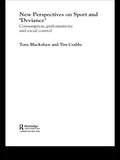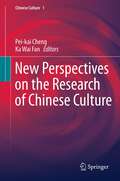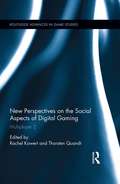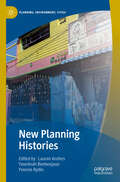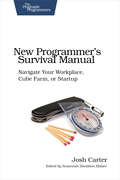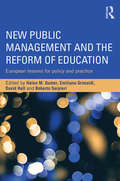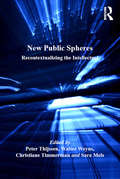- Table View
- List View
New Orleans on Parade: Tourism and the Transformation of the Crescent City (Making the Modern South)
by J. Mark SoutherNew Orleans on Parade tells the story of the Big Easy in the twentieth century. In this urban biography, J. Mark Souther explores the Crescent City's architecture, music, food and alcohol, folklore and spiritualism, Mardi Gras festivities, and illicit sex commerce in revealing how New Orleans became a city that parades itself to visitors and residents alike.Stagnant between the Civil War and World War II -- a period of great expansion nationally -- New Orleans unintentionally preserved its distinctive physical appearance and culture. Though business, civic, and government leaders tried to pursue conventional modernization in the 1940s, competition from other Sunbelt cities as well as a national economic shift from production to consumption gradually led them to seize on tourism as the growth engine for future prosperity, giving rise to a veritable gumbo of sensory attractions. A trend in historic preservation and the influence of outsiders helped fan this newfound identity, and the city's residents learned to embrace rather than disdain their past.A growing reliance on the tourist trade fundamentally affected social relations in New Orleans. African Americans were cast as actors who shaped the culture that made tourism possible while at the same time they were exploited by the local power structure. As black leaders' influence increased, the white elite attempted to keep its traditions -- including racial inequality -- intact, and race and class issues often lay at the heart of controversies over progress. Once the most tolerant diverse city in the South and the nation, New Orleans came to lag behind the rest of the country in pursuing racial equity.Souther traces the ascendancy of tourism in New Orleans through the final decades of the twentieth century and beyond, examining the 1984 World's Fair, the collapse of Louisiana's oil industry in the eighties, and the devastating blow dealt by Hurricane Katrina in 2005. Narrated in a lively style and resting on a bedrock of research, New Orleans on Parade is a landmark book that allows readers to fully understand the image-making of the Big Easy.
New Perspectives in Behavioral Cybersecurity II: Human Behavior for Business, Profiling, Linguistics and Voting
by Wayne PattersonAs the digital world expands and cyber threats grow more sophisticated, the need for insights from diverse disciplines becomes crucial. Following on from the editor's 2023 title New Perspectives in Behavioral Cybersecurity I, this book presents studies covering a wide range of the latest topics in cybersecurity -- from hybrid intelligence in banking security to the connection between physical and cybersecurity attitudes.This volume introduces innovative perspectives from countries as varied as Brazil, Bulgaria, Cameroon, and the Philippines, among others, reflecting the global nature of cyber challenges. New Approaches in Behavioral Cybersecurity II: Human Behavior for Business, Profiling, Linguistics, and Voting brings together international perspectives that explore how human behavior intersects with cybersecurity. The chapters highlight the integration of behavioral sciences such as psychology, economics, and sociology with traditional cybersecurity approaches. Contributors examine linguistic differences in cyberattacks, explore the impact of personality on hacking behavior, and provide insights into ethical practices in the digital age. The reader will be able to take a different and international look at the complex and evolving world of cybersecurity.An ideal read for cybersecurity professionals, human factors practitioners, academics, and students, this book will help readers broaden their understanding of how human behavior influences cyber defenses.
New Perspectives in Caribbean Tourism
by Donna Chambers Sherma Roberts Marcella DayeThe Caribbean is one of the most tourism dependent regions of the world. This edited volume extends beyond the frontiers of normative perspectives of tourism development to incorporate "new" ideas and perspectives that relate to the socio-cultural, political and economic realities of these societies. This edited text therefore explores tourism in t
New Perspectives in Critical Data Studies: The Ambivalences of Data Power (Transforming Communications – Studies in Cross-Media Research)
by Andreas Hepp Leif Kramp Juliane JarkeThis Open Access book examines the ambivalences of data power. Firstly, the ambivalences between global infrastructures and local invisibilities challenge the grand narrative of the ephemeral nature of a global data infrastructure. They make visible local working and living conditions, and the resources and arrangements required to operate and run them. Secondly, the book examines ambivalences between the state and data justice. It considers data justice in relation to state surveillance and data capitalism, and reflects on the ambivalences between an “entrepreneurial state” and a “welfare state”. Thirdly, the authors discuss ambivalences of everyday practices and collective action, in which civil society groups, communities, and movements try to position the interests of people against the “big players” in the tech industry. The book includes eighteen chapters that provide new and varied perspectives on the role of data and data infrastructures in our increasingly datafied societies.
New Perspectives in Network Studies: A Multidisciplinary Approach
by Anna Moretti Lisa BalzarinIn line with the multi-disciplinary nature of network research, this edited volume collects both empirical and conceptual contributions that nurture the debate on network research, specifically dealing with the topics of network performance and agency. The contributions draw on different literatures and epistemic approaches and address different levels of analysis, both from a static and a dynamic point of view. It will be of great interest to academics and students developing research in the field of network studies. It will also be of interest to scholars of operations management, organization studies, strategy, innovation, financial management and business history.
New Perspectives on Current Development Policy: Covid-19, the Digital Divide, and State Internet Regulation (SpringerBriefs in Economics)
by Jeffrey JamesThis book presents new perspectives on current development policy against the background of the Covid-19 pandemic. The author applies new methodological, disciplinary, and analytical approaches to examine specific major contemporary policy issues. The topics covered include the impact of the Covid-19 pandemic in developing countries, an anomaly in the digital divide, Internet connectivity differences in Sub-Saharan Africa, and the domination of India in the spread of new, low-cost smart feature phones.This book is a must-read for a general audience interested in the current development policy in the light of the current Covid-19 pandemic, as well as for students and researchers of development economics and development studies who are interested in issues involving the digital divide and state policy towards the internet in the Global-South.
New Perspectives on Curriculum, Learning and Assessment
by David ScottThis book offers a detailed analysis and assessment of the state of education round the world. The argument is made that education and curriculum practices are deficient for two reasons. The first is the adoption by governments, policy-makers and practitioners of a set of knowledge practices that can be broadly characterised as empiricist and technicist, and which has come to dominate how curricula are constructed and certainly how education systems and their work can be described. The second is the adoption of a model of curriculum that is both backward-looking and, in its own terms, confused and muddled. This book then sets out an alternative model, which is more cogent and better focused on human wellbeing.
New Perspectives on Emotions in Finance: The Sociology of Confidence, Fear and Betrayal (Routledge International Studies in Money and Banking #76)
by Jocelyn PixleyThe financial crisis that started in 2007 is a concern for the world. Some countries are in depression and governments are desperately trying to find solutions. In the absence of thorough debate on the emotions of money, bitter disputes, hatred and ‘moralizing’ can be misunderstood. New Perspectives on Emotions in Finance carefully considers emotions often left unacknowledged, in order to explain the socially useful versus de-civilising, destructive, nature of money. This book offers an understanding of money that includes the possible civilising sentiments. This interdisciplinary volume examines what is seemingly an uncontrollable, fragile world of finance and explains the ‘panics’ of traders and ‘immoral panics’ in banking, ‘confidence’ of government and commercial decision makers, ‘shame’ or ‘cynicism’ of investors and asymmetries of ‘impersonal trust’ between finance corporations and their many publics. Money is shown to rely on this abstract trust or ‘faith’, but such motivations are in crisis with ‘angry’ conflicts over the ‘power of disposition’. Restraining influences – on ‘uncivilised emotions’ and rule breaking – need democratic consensus, due to enduring national differences in economic ‘sentiments’ even in ostensibly similar countries. Promising ideas for global reform are assessed from these cautionary interpretations. Instead of one ‘correct’ vision, sociologists in this book argue that corporations and global dependencies are driven by fears and normless sentiments which foster betrayal. This book is not about individuals, but habitus and market crudities. Human ‘nature’ or ‘greed’ cannot describe banks, which do not ‘feel’ because their motivations are not from personal psyches but organisational pressures, and are liable to switch under money’s inevitable uncertainties. This more inclusive social science studies emotions as a crucial factor among others, to expand the informed public debate among policy makers, bankers, academics, students and the public.
New Perspectives on Health and Social Care (International Perspectives on Social Policy, Administration, and Practice)
by Jason PowellThe relationship between health, social care, and the teaching of disciplines such as sociology, social work, and social policy are increasing in many regions worldwide. This book explores the relationship between wider social theory and social welfare though an understanding of how power and resistance impinges on how helping professions operate in health and social spaces in the twenty-first century. The book presents a critical analysis of major Foucauldian theories and social issues in the construction and practice of health and social welfare. It discusses important theoretical and substantive contributions to current debates and presents an engaging, comprehensive, and innovative perspective to address both how power and resistance shape the way we live and how the way we live shapes the way in which we understand social relations among professionals, policy makers, and user groups in comparative contexts. The purpose of this book is to critically inform debates concerning the abstract and empirical features of health and social care examined through the lens of innovative theoretical perspectives emanating from Foucauldian theories.
New Perspectives on Human Resource Management (Routledge Revivals)
by John StoreyThe idea of human resource management has become topical and controversial. The term suggests that people in any organization are an asset to be upgraded and fully utilized rather than merely a variable cost to be minimized. This in turn implies that the way in which people are managed is a matter of crucial strategic concern. Increased international competition has produced various initiatives world-wide for new approaches to management, in particular human resource management. This searching set of interpretations, first published in 1983, will be of interest to serious practitioners and students alike.
New Perspectives on Inner Speech (SpringerBriefs in Psychology)
by Pablo FossaInner speech has been a focus of multidisciplinary interest. It is a long-standing phenomenon of study in philosophy, psychology, and anthropology. Researchers from different disciplines have turned their efforts to understand this inherent experience of being "talking to oneself". In psychology, Vygotsky managed to develop a complete description of the phenomenon, giving rise to a great line of research related to inner speech in the human experience. Including a compilation of theoretical and empirical advances related to inner speech phenomenon, this book is aimed at academics and researchers in the area of psychology, education and culture. This book will be of interest to international research programs, related to cultural psychology, socio-constructivism, developmental psychology and education.
New Perspectives on Malthus
by Robert J. MayhewThomas Robert Malthus (1766–1834) was a pioneer in demography, economics and social science more generally whose ideas prompted a new 'Malthusian' way of thinking about population and the poor. On the occasion of the two hundred and fiftieth anniversary of his birth, New Perspectives on Malthus offers an up-to-date collection of interdisciplinary essays from leading Malthus experts who reassess his work. Part one looks at Malthus's achievements in historical context, addressing not only perennial questions such as his attitude to the Poor Laws, but also new topics including his response to environmental themes and his use of information about the New World. Part two then looks at the complex reception of his ideas by writers, scientists, politicians and philanthropists from the period of his own lifetime to the present day, from Charles Darwin and H. G. Wells to David Attenborough, Al Gore and Amartya Sen.
New Perspectives on Mind-Wandering
by Luca Tateo Nadia DarioIn the last decade, a great variety and volume of scholarly work has appeared on mind-wandering, a mental process involving a vast range of human life, connected with “first-person perspective” and “personhood”, submental thinking, mental autonomy, etc. While different and emerging features that flow into and out of one another (second field, mental travel, visual imagery, inner speech, unspecific memory, autobiographical memory, fantasies, introspection, etc.) and negative and positive approaches seem to describe mind-wandering, we offer an interdisciplinary theoretical and empirically informed and informative overview on mind-wandering studies and methodologies oriented toward the educational field. The aim is to transform and enrich the debate on mind-wandering but also to show how theoretical arguments and research findings could inform the teaching-learning context.This groundbreaking book, moves along three representations of developed scientific knowledge: imaginary lines, circles and spirals. The first section, “The Lines”, develops new lines of inquiry on attention (selective and sustained) and mind-wandering, the influence of age and mind-wandering, embodiment, consciousness and experience and mind-wandering. In the second section, the “Circles”, groups of Chapters on the same topic, methodology (tasks and measurement), intervention (auditory beat stimulation and mindfulness practices) and creativity, recreate a dance of interacting parts in which there are always profitable, decisive and retroactive exchanges between the information that each group or author activates. The last section, “The Spirals”, critically discusses the absence of a unified theoretical perspective, in the pedagogical field, attentive both to the processes of emergence and the interactions between parts.
New Perspectives on Moral Change: Anthropologists and Philosophers Engage with Transformations of Life Worlds (WYSE Series in Social Anthropology #13)
by Nora Hämäläinen Cecilie EriksenThe world we live in is constantly changing. Climate change, transforming gender conceptions, emerging issues of food consumption, novel forms of family life and technological developments are altering central areas of our forms of life. This raises questions of how to cope with and understand the moral changes implicit in such alterations. This volume is the first to address moral change as such. It brings together anthropologists and philosophers to discuss how to study and theorize the change of norms, concepts, emotions, moral frameworks and forms of personhood.
New Perspectives on Mutual Dependency in Care-Giving
by Adéla SouralováMany scholars see caregiving relationships as being based on mutual dependency or interdependency. Extensively cited notions of the ’global care chain’ or ’international division of reproductive labour’ have prepared the ground for analysis of global interdependencies in several domains. This book goes further by taking mutual dependency as a starting point for analysing all relationships. Using the example of Vietnamese families in the Czech Republic and the Czech native nannies, it shows how paid caregiving is contextualized in terms of various relationships between three types of actors: employer-employee, caring for the child, and mother-child. All of these ties are based on ontologically different principles and each of them operates as a piece of a puzzle, which is meaningful only in relation to each other. Souralová considers caregiving to be a formative activity that establishes ties between the concerned actors, whose subjectivities are mutually shaped in the daily practice of caregiving. With its stress on mutuality in care work, this ground-breaking book illuminates the new forms of interpersonal, interethnic, and intergenerational relationships and highlights the mechanisms and processes in which kinship ties are negotiated and reproduced.
New Perspectives on People and Forests
by Dainis Dauksta Eva RitterThe aim of this book is to elucidate the role of forests as part of a landscape in the life of people. Most landscapes today are cultural landscapes that are influenced by human activity and that in turn have a profound effect on our understanding of and identification with a place. The book proposes that a better understanding of the bond between people and forests as integrated part of a landscape may be helpful in landscape planning, and may contribute to the discussion of changes in forest cover which has been motivated by land use changes, rural development and the global climate debate. To this end, people's perception of forest landscapes, the reasons for different perceptions, and future perspectives are discussed. Given the wide range of forest landscapes, and cultural perspectives which exist across the world, the book focuses on Europe as a test case to explore the various relationships between society, culture, forests and landscapes. It looks at historical evidence of the impacts of people on forests and vice versa, explores the current factors affecting people's physical and emotional comfort in forest landscapes, and looks ahead to how changes in forest cover may alter the present relationships of people to forests. Drawing together a diverse literature and combining the expertise of natural and social scientists, this book will form a valuable reference for students and researchers working in the fields of landscape ecology and landscape architecture, geography, social science, environmental psychology or environmental history. It will also be of interest to researchers, government agencies and practitioners with an interest in issues such as sustainable forest management, sustainable tourism, reserve management, urban planning and environmental interpretation.
New Perspectives on Racial Identity Development
by Bailey W. Jackson Charmaine L. WijeyesingheNew Perspectives on Racial Identity Development brings together leaders in the field to deepen, broaden, and reassess our understandings of racial identity development. Contributors include the authors of some of the earliest theories in the field, such as William Cross, Bailey W. Jackson, Jean Kim, Rita Hardiman, and Charmaine L. Wijeyesinghe, who offer new analysis of the impact of emerging frameworks on how racial identity is viewed and understood. Other contributors present new paradigms and identify critical issues that must be considered as the field continues to evolve. <p><p> This new and completely rewritten second edition uses emerging research from related disciplines that offer innovative approaches that have yet to be fully discussed in the literature on racial identity. Intersectionality receives significant attention in the volume, as it calls for models of social identity to take a more holistic and integrated approach in describing the lived experience of individuals. <p> This volume offers new perspectives on how we understand and study racial identity in a culture where race and other identities are socially constructed and carry significant societal, political, and group meaning.
New Perspectives on Sport and 'Deviance': Consumption, Peformativity and Social Control
by Tony Blackshaw Tim CrabbeThe everyday makeup of contemporary sport is increasingly characterised by a perceived explosion of 'deviance' - violence, drug taking, racism, homophobia, misogyny, corruption and excess. Whereas once these behaviours may have been subject to the moral judgments of authority, in the face of dramatic socio-cultural change they become more a matter of populist consumer gaze. In addressing these developments this book provides a new and insightful approach toward the study of 'deviance' in the realm of sport. New Perspectives in Sport and 'Deviance' awakens the sociology of sport to the possibilities of re-imagining 'deviance' and offers an evocative approach which will appeal both to academics and students in the field of sociology of sport and sociology of deviance.
New Perspectives on the Research of Chinese Culture
by Pei-Kai Cheng Ka Wai FanThis volume contains high quality articles, originally published in Chinese in the Chinese Journal Jiuzhou Xuelin [Chinese Cultural Quarterly] and new articles written on special invitation by established scholars in the field. The theme of the volume is 'New Perspectives on Research of Chinese Culture', introducing the latest trends and new developments in the research into Chinese history, humanities, music and geography. The articles are written by well-known scholars in the field who examine Chinese culture from various new perspectives adopting different research methods.
New Perspectives on the Social Aspects of Digital Gaming: Multiplayer 2 (Routledge Advances in Game Studies)
by Thorsten Quandt Rachel KowertExpanding on the work in the volume Multiplayer, this new book explores several other areas related to social gaming in detail. The aim is to go beyond a typical "edited book" concept, and offer a very concise volume with several focal points that are most relevant for the current debate about multiplayer games, both in academia and society. As a result, the volume offers the latest research findings on online gaming, social forms of gaming, identification, gender issues and games for change, primarily applying a social-scientific approach.
New Planning Histories (Planning, Environment, Cities)
by Yvonne Rydin Lauren Andres Yasminah BeebeejaunThis book brings new scholarship to students on the origins and development of planning thoughts, theories, policies, institutions and practices, outlining how these have shaped planning as a state and professional activity. It showcases the work of leading scholars working to develop new histories of planning, giving particular attention to the impact of colonisation and its approach to race, which has significantly impacted planning processes, as well as to the importance of women and people of colour as significant actors in the development of planning policy and practices. The chapters bring a much-needed global and comparative perspective, including views from the &‘Global South&’ and from countries where planning remains an under-resourced and under-recognised profession. This is an essential resource for advanced undergraduate and graduate students in planning, architecture and urban studies.
New Political Spaces in Latin American Natural Resource Governance (Studies of the Americas)
by Håvard HaarstadCase studies written by anthropologists, geographers, political scientists, and sociologists provide empirical detail and analytical insight into states' and communities' relations to natural resource sectors, and show how resource dependencies continue to shape their political spaces.
New Programmer's Survival Manual: Navigate Your Workplace, Cube Farm, or Startup
by Joshua D. CarterIt's your first day on the new job. You've got the programming chops, you're up on the latest tech, you're sitting at your workstation... now what? New Programmer's Survival Manual gives your career the jolt it needs to get going: essential industry skills to help you apply your raw programming talent and make a name for yourself. It's a no-holds-barred look at what really goes on in the office--and how to not only survive, but thrive in your first job and beyond.Programming at industry level requires new skills - you'll build programs that dwarf anything you've done on your own. This book introduces you to practices for working on large-scale, long-lived programs at a professional level of quality. You'll find out how to work efficiently with your current tools, and discover essential new tools.But the tools are only part of the story; you've got to get street-smart too. Succeeding in the corporate working environment requires its own savvy. You'll learn how to navigate the office, work with your teammates, and how to deal with other people outside of your department. You'll understand where you fit into the big picture and how you contribute to the company's success. You'll also get a candid look at the tougher aspects of the job: stress, conflict, and office politics.Finally, programming is a job you can do for the long haul. This book helps you look ahead to the years to come, and your future opportunities--either as a programmer or in another role you grow into.There's nothing quite like the satisfaction of shipping a product and knowing, "I built that." Whether you work on embedded systems or web-based applications, in trendy technologies or legacy systems, this book helps you get from raw skill to an accomplished professional.
New Public Management and the Reform of Education: European lessons for policy and practice
by David Hall Helen M. Gunter Roberto Serpieri Emiliano GrimaldiNew Public Management and the Reform of Education addresses complex and dynamic changes to public services by focusing on new public management as a major shaper and influencer of educational reforms within, between and across European nation states and policy actors. The contributions to the book are diverse and illustrate the impact of NPM locally but also the interplay between local and European policy spheres. The book offers: A critical overview of NPM through an analysis of debates, projects and policy actors A detailed examination of NPM within 10 nation states in Europe A robust engagement with the national and European features of NPM as a policy strategy The book actively contributes to debates and analysis within critical policy studies about the impact and resilience of NPM, and how through a study of educational reforms in a range of political systems with different traditions and purposes a more nuanced and complex picture of NPM can be built. As such the book not only speaks to educational researchers and professionals within Europe but also to policymakers, and can inform wider education and policy communities internationally.
New Public Spheres: Recontextualizing the Intellectual (Public Intellectuals and the Sociology of Knowledge)
by Sara Mels Peter Thijssen Walter WeynsThe public sphere provides a domain of social life in which public opinion is expressed by means of rational discourse and debate. Habermas linked its historical development to the coffee houses and journals in England, Parisian salons and German reading clubs. He described it as a bourgeois public sphere, where private people come together and where they turn from a politically disempowered bourgeoisie into an effective political agent - the public intellectual. With communication networks being diversified and expanded over time, the worldwide web has put pressure on traditional public spheres. These new informal and horizontal networks shaped by the internet create new contexts in which an anonymous and dispersed public may gather in political e-communities to reflect critically on societal issues. These de-centered modes of communication and influence-seeking change the role of the (traditional) public intellectual and - at first sight - seem to make their contributions less influential. What processes, therefore, influence changes within public spheres and how can intellectuals assert authority within them? Should we speak of different types of intellectuals, according to the different modes of public intellectual engagement? This ground-breaking volume gives a multi-disciplinary account of the way in which public intellectuals have constructed their role and position in the public sphere in the past, and how they try to voice public concerns and achieve authority again within those fragmented public spheres today.
